| |||||
| Decades: | |||||
|---|---|---|---|---|---|
| See also: | |||||
Events in the year 2018 in South Sudan .
| |||||
| Decades: | |||||
|---|---|---|---|---|---|
| See also: | |||||
Events in the year 2018 in South Sudan .
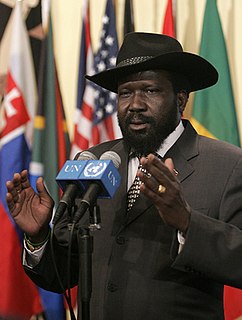
Salva Kiir Mayardit is a Dinka South Sudanese politician who has been President of South Sudan since its independence in 2011. Prior to independence, he was President of the Government of Southern Sudan, as well as First Vice President of Sudan, from 2005 to 2011.

James Wani Igga is a South Sudanese politician who is currently serving as the Vice President of South Sudan. He was Speaker of the National Legislative Assembly from 2011 to 2013 and secretary general of the SPLM.
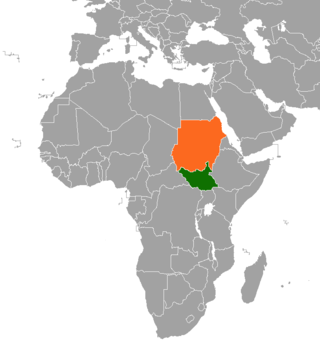
Sudanese nomadic conflicts are non-state conflicts between rival nomadic tribes taking place in the territory of Sudan and, since 2011, South Sudan. Conflict between nomadic tribes in Sudan is common, with fights breaking out over scarce resources, including grazing land, cattle and drinking water. Some of the tribes involved in these clashes have been the Messiria, Maalia, Rizeigat and Bani Hussein Arabic tribes inhabiting Darfur and West Kordofan, and the Dinka, Nuer and Murle African ethnic groups inhabiting South Sudan. Conflicts have been fueled by other major wars taking place in the same regions, in particular the Second Sudanese Civil War, the War in Darfur and the Sudanese conflict in South Kordofan and Blue Nile.
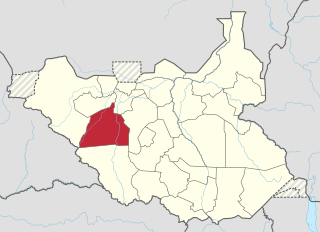
Wau State is one of the 28 states of South Sudan that formed on 2 October 2015. It is located in the Bahr el Ghazal region, and was part of the former state of Western Bahr el Ghazal. Wau State borders Aweil State, Gbudwe State, Gogrial State, Lol State, and Tonj State.
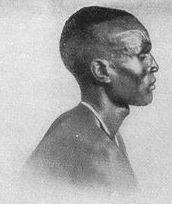
The Dinka people are a Nilotic ethnic group native to South Sudan, but also having a sizable diaspora population. They mostly live along the Nile, from Mangalla to Renk, in regions of Bahr el Ghazal, Upper Nile and Abyei Area of the Ngok Dinka in South Sudan.
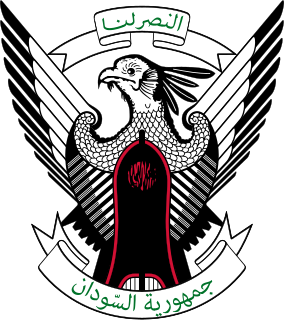
Officially, the politics of Sudan takes place in the framework of a presidential representative democratic consociationalist republic, where the President of Sudan is head of state, head of government and commander-in-chief of the Sudanese Armed Forces in a multi-party system. Legislative power is vested in both the government and in the two chambers, the National Assembly (lower) and the Council of States (upper), of the bicameral National Legislature. The judiciary is independent and obtained by the Constitutional Court. However, following a deadly civil war and the still ongoing genocide in Darfur, Sudan was widely recognized as a totalitarian state where all effective political power was held by President Omar al-Bashir and the National Congress Party (NCP). However, al-Bashir and the NCP were ousted in a military coup which occurred on April 11, 2019. The government of Sudan is now led by the "Transitional Military Council".

Jonglei is a state of South Sudan. On 2 October 2015 the President Salva Kiir Mayardit decreed the creation of the new Jonglei State along with 27 other states replacing 10 previous states. The earlier Jonglei state comprised three counties of Bor, Twic East and Duk and was the largest state by area before reorganisation, with approximately 122,581 km2, as well as the most populous according to the controversial 2008 census conducted during present-day South Sudan's second period of autonomy. Bor is the capital of the state.
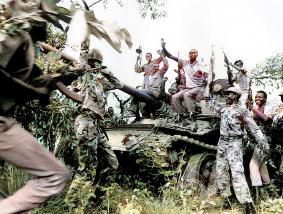
The Second Sudanese Civil War was a conflict from 1983 to 2005 between the central Sudanese government and the Sudan People's Liberation Army. It was largely a continuation of the First Sudanese Civil War of 1955 to 1972. Although it originated in southern Sudan, the civil war spread to the Nuba mountains and the Blue Nile. It lasted for 22 years and is one of the longest civil wars on record. The war resulted in the independence of South Sudan six years after the war ended.

John Garang de Mabior was a Sudanese politician and revolutionary leader. From 1983 to 2005, he led the Sudan People's Liberation Army during the Second Sudanese Civil War, and following a peace agreement he briefly served as First Vice President of Sudan for 3 weeks until his death in a helicopter crash on 30 July 2005. A developmental economist by profession, Garang was a major influence on the movement that led to the foundation of South Sudan.

Riek Machar Teny Dhurgon is a South Sudanese politician who served as the inaugural Vice President of South Sudan, from its independence in 2011 until his dismissal in 2013. Between April and July 2016 Machar served as the First Vice President of South Sudan. He now leads the rebel faction opposing Salva Kiir known as SPLM-IO.

The politics of South Sudan concern the system of government in the Republic of South Sudan, a country in East Africa, and the people, organisations, and events involved in it.

The Sudan People's Liberation Army (SPLA) is the army of the Republic of South Sudan. The SPLA was founded as a guerrilla movement against the government of Sudan in 1983 and was a key participant of the Second Sudanese Civil War. Throughout the war, it was led by John Garang.
Peter Gatdet Yak or Peter Gadet was a former Sudan People's Liberation Army (SPLA) general who was the leader of the South Sudan Liberation Army (SSLA), a rebel movement in South Sudan. He was born between 1957 and 1959 in Mayom County, South Sudan.

The Sudanese conflict in South Kordofan and Blue Nile, also referred to by some media as the Third Sudanese Civil War, is an ongoing armed conflict in the Sudanese southern states of South Kordofan and Blue Nile between the Sudanese Army (SAF) and Sudan People's Liberation Movement-North (SPLM-N), a northern affiliate of the Sudan People's Liberation Movement (SPLM) in South Sudan. After some years of relative calm following the 2005 agreement which ended the second Sudanese civil war between the Sudanese government and SPLM rebels, fighting broke out again in the lead-up to South Sudan independence on 9 July 2011, starting in South Kordofan on 5 June and spreading to the neighboring Blue Nile state in September. SPLM-N, splitting from newly-independent SPLM, took up arms against the inclusion of the two southern states in Sudan with no popular consultation and against the lack of democratic elections. The conflict is intertwined with the War in Darfur, since in November 2011 SPLM-N established a loose alliance with Darfuri rebels, called Sudan Revolutionary Front (SRF).

South Sudan, officially known as the Republic of South Sudan, is a landlocked country in East-Central Africa.It gained independence from the Republic of the Sudan in 2011, making it the most recently recognized sovereign state. Its capital and largest city is Juba.
The history of South Sudan comprises the history of the territory of present-day South Sudan and the peoples inhabiting the region.

General Paul Malong Awan Anei is a South Sudanese politician and military figure. He formerly served as governor of Northern Bahr el Ghazal from 27 March 2008 to 2014.

The Heglig Crisis was a brief war fought between the countries of Sudan and South Sudan in 2012 over oil-rich regions between South Sudan's Unity and Sudan's South Kordofan states. South Sudan invaded and briefly occupied the small border town of Heglig before being pushed back by the Sudanese army. Small-scale clashes continued until an agreement on borders and natural resources was signed on September 26, resolving most aspects of the conflict.

The South Sudan Air Force (SSAF), also previously known as the Sudan People's Air Force or Sudan People's Liberation Air Force, is the air force of the South Sudan People's Defense Forces (SSPDF) of South Sudan. The headquarters are located in Juba Air Base, Juba.

The South Sudanese Civil War is an ongoing conflict in South Sudan between forces of the government and opposition forces. In December 2013, President Kiir accused his former deputy Riek Machar and ten others of attempting a coup d'état. Machar denied trying to start a coup and fled to lead the SPLM – in opposition (SPLM-IO). Fighting broke out between the Sudan People's Liberation Movement (SPLM) and SPLM-IO, igniting the civil war. Ugandan troops were deployed to fight alongside the South Sudanese government. The United Nations has peacekeepers in the country as part of the United Nations Mission in South Sudan (UNMISS). In January 2014 the first ceasefire agreement was reached. Fighting continued and would be followed by several more ceasefire agreements. Negotiations were mediated by "IGAD +". A peace agreement known as the "Compromise Peace Agreement" was signed in August 2015. Machar returned to Juba in 2016 and was appointed vice president. Following a second breakout of fighting within Juba, the SPLM-IO fled to the surrounding and previously peaceful Equatoria region. Kiir replaced Machar as First Vice President with Taban Deng Gai, splitting the opposition, and rebel in-fighting has become of major part of the conflict. Rivalry among Dinka factions led by the President and Paul Malong Awan have also led to fighting. In August 2018, another power sharing agreement came into effect.

The Sudan People's Liberation Movement-in-Opposition, also known as the anti-governmental forces (AGF), is a mainly South Sudanese political party and rebel group that split from the Sudan People's Liberation Movement in 2013, due to political tensions between President Salva Kiir and Vice President Riek Machar over leadership of the SPLM. Tensions grew between forces loyal to Kiir and Machar and South Sudan plunged into the South Sudanese Civil War.
Mathiang Anyoor, also spelled Mathiang Anyur, also known as Dot Ke Beny, is a Dinka-affiliated militia group in South Sudan. Originally an ad-hoc volunteer force founded in 2012, the militia was transformed into a private army to protect President Salva Kiir Mayardit and army chief Paul Malong Awan. However, the SPLA claim that it is just another battalion. Much of the ethnic violence against non-Dinkas in the South Sudanese Civil War is attributed to the militia.
James Ajongo Mawut was a South Sudanese Chief of Defence Force. He was appointed on 9 May 2017 and took-over the office on 10 May 2017 after he was sworn in by the President Salva Kiir Mayardit in the presidential palace. He is an Aweilian in a native land of Barmayen, which indicates that he is from the Luo people. Current deputy governor of Aweil Uber Mawut is his biological brother.

On the morning of 11 April 2019, Sudanese dictator Omar al-Bashir was removed from power by the Sudanese Armed Forces amid ongoing protests after holding the office for nearly 30 years.
This article lists events from the year 2019 in South Sudan